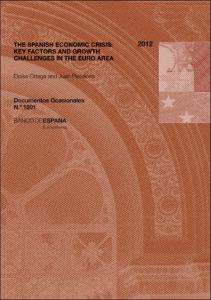Registro completo de metadatos
| Campo DC | Valor |
|---|---|
| dc.contributor.author | Ortega Regato, Eloísa |
| dc.contributor.author | Peñalosa, Juan |
| dc.coverage.spatial | España |
| dc.coverage.spatial | Zona euro |
| dc.date.accessioned | 2019-08-10T17:08:48Z |
| dc.date.available | 2019-08-10T17:08:48Z |
| dc.date.issued | 2012-01-26 |
| dc.identifier.issn | ISSN: 1696-2230 (en línea) |
| dc.identifier.uri | https://repositorio.bde.es/handle/123456789/6371 |
| dc.description | Incluye bibliografía |
| dc.description.abstract | The economic crisis affecting the industrialised countries in recent years has been singular given its intensity, complexity and the difficulties in overcoming it. The aim of this paper is to analyse the determinants behind the crisis that have made it deeper and longer in Spain than in previous instances, and which have meant that there are significant obstacles to emerging from recession. Spanish EMU membership is a crucial aspect for consideration, as it contributes both to explaining the build-up of imbalances in the expansion and to conditioning the nature of the adjustment in the crisis, given that the range of economic policy instruments is significantly narrower in EMU. The macroeconomic and financial imbalances accumulated in the high-growth phase (the real estate boom, excess debt and the loss in competitiveness), which are all closely interlinked, were factors of vulnerability. But even apparently sounder fundamentals on other fronts, such as the budgetary and labour market situation, saw their weaknesses exposed in the crisis. The experience over the past four years allows some lessons to be drawn on the external sector, the real estate market, fiscal policy and the labour market. These lessons point in particular to the need to avoid complacency in economic policy management in boom periods and to the urgency of adapting the structure of goods and factor markets and the behaviour of economic agents in Spain to the requirements imposed by membership of a monetary union |
| dc.format.extent | 37 p. : gráf. |
| dc.language.iso | en |
| dc.publisher | Banco de España |
| dc.relation.ispartof | Documentos Ocasionales / Banco de España, 1201 |
| dc.relation.hasversion | Versión en español 123456789/6361 |
| dc.rights | Reconocimiento-NoComercial-CompartirIgual 4.0 Internacional (CC BY-NC-SA 4.0) |
| dc.rights | In Copyright - Non Commercial Use Permitted |
| dc.rights.uri | https://creativecommons.org/licenses/by-nc-sa/4.0/deed.es_ES |
| dc.rights.uri | http://rightsstatements.org/vocab/InC-NC/1.0/ |
| dc.subject | Spanish economy |
| dc.subject | EMU |
| dc.subject | Economic crisis |
| dc.subject | Competitiveness |
| dc.subject | Real estate market |
| dc.subject | Debt |
| dc.title | The Spanish economic crisis : key factors and growth challenges in the euro area |
| dc.type | Documento de trabajo |
| dc.identifier.bdebib | 000362039 |
| dc.identifier.bdepub | DOCA-201201-eng |
| dc.subject.bde | Evolución y desarrollo económicos |
| dc.publisher.bde | Madrid : Banco de España, 2012 |
| dc.subject.jel | E60 |
| dc.subject.jel | E65 |
| dc.subject.jel | F32 |
| dc.subject.jel | G01 |
| dc.subject.jel | H12 |












